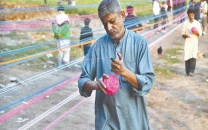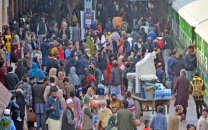Stay clear of our soil: army chief warns India
Says Pakistan will do anything to protect its territory

PHOTO: ISPR
“(Narendra) Modi, RAW (Research and Analysis Wing) or whosoever is, our borders are completely secured,” said Gen Raheel while addressing the concluding ceremony of a seminar on the China-Pakistan Economic Corridor in Gilgit.
The Chief of Army Staff chose Gilgit to hit back at the Indian premier who had made a reference to the region earlier in August.
In his 94-minute-long independence day speech on August 15, Modi had claimed that some residents of Balochistan and Gilgit had thanked him for saying that security forces have committed human rights violations in their region.
The speech drew widespread condemnation from Islamabad with the Foreign Office calling it crossing a red line.
“We are aware of our enemies, know their tactics and to spoil their designs we would cross even the last limit,” Gen Raheel asserted.
The army chief went on to say that they will leave no stone unturned for the security and stability of the country, adding that Pakistan was moving in the right direction and that there should be no doubt about that.
He also shot a warning to detractors, reminding them that Pakistan’s army was second to none and a battle hardened force.

CPEC security
Talking about the multibillion dollar corridor, Gen Raheel reassured that “we will materialise CPEC.” Noting that Gilgit-Baltistan was the gateway for the $46 billion umbrella project, the region would be developed at par with neighbouring Chinese cities.
In this regard, he announced that a second security division will be raised, called south-Special Security Division (SSD), to provide security to CPEC projects. It will be responsible for providing security for the corridor from Rawalpindi to the souther port of Gwadar.
The first SSD group, which will be called north SSD, will provide security to CPEC from the Pakistan-China border crossing of Khunjerab to Rawalpindi besides. Additionally, the Army chief said it will assist stakeholders, including provinces, in CPEC matters.
These forces will also be the first respondent force for nuclear power plants.
Gen Raheel assured that despite the military’s intensive commitments in Balochistan, the on-going Operation Zarb-e-Azb and its commitments on the country’s eastern borders, the CPEC would be provided fully security.
The Army chief also addressed some domestic concerns as he reiterated his commitment to break an “evil nexus” of corruption, terrorism and crimes, adding that it was vital for Pakistan’s survival.
“The evil nexus has to be broken at all cost and there can be no progress without breaking this nexus,” he said.
Gen Raheel added that the people had not sacrificed their lives to protect facilitators, financiers of terrorists and sleeper cells.
Commending the hard-working people of Gilgit, the Army chief announced several projects for Gilgit-Baltistan people. These include a technical institute to train up to 800 students, a medical city in Gilgit equipped with all medical facilities, a campus of the National University of Science and Technology (NUST) and the rehabilitation of the Jaglot-Sakardu road.
Earlier, G-B Chief Minister Hafiz Hafeezur Rehman said the federal government has constituted a commission under the Adviser to Prime Minister on Foreign Affairs Sartaj Aziz to resolve the status of G-B.
“We understand the diplomatic complications, but people of the region want to be made a part of Pakistan’s constitution,”Rehman said.
He proposed to make four routes — including Babusar Road, Gilgit-Chitral Road and Shaunter Pass Road — so that the CPEC can operate in all weather conditions.
Published in The Express Tribune, September 2nd, 2016.



















COMMENTS
Comments are moderated and generally will be posted if they are on-topic and not abusive.
For more information, please see our Comments FAQ